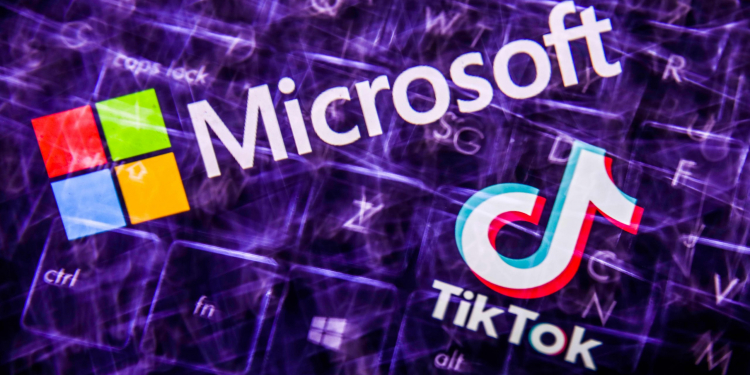The FINANCIAL — Microsoft says that it’s not acquiring parts of TikTok’s operations after its bid was rejected by Beijing-based ByteDance. After weeks of public back and forths, Microsoft ultimately failed in its attempts to acquire TikTok. Talk of a sale began as President Donald Trump issued executive orders last month seeking to ban TikTok and requiring that its US operations be spun off from its parent company. It’s not clear exactly what will happen to TikTok in the US now that Microsoft has been unsuccessful in its bid, but it leaves the door open for Oracle as a potential buyer.
Microsoft made a statement about TikTok on September 13. They stated that ByteDance let them know that they would not be selling TikTok’s US operations to Microsoft. Microsoft said that they are confident this proposal would have been good for TikTok’s users while protecting national security interests. In August’s statement, Microsoft stated that they would have made significant changes to ensure the service met the highest standards for security, privacy, online safety, and combatting disinformation, and the company made these principles clear in our August statement. Microsoft is looking forward to seeing how the service evolves in these important areas.
Microsoft originally confirmed last month that it was pursuing a deal to buy TikTok’s operations in the US, Australia, Canada, and New Zealand. Reports also suggested Microsoft might be considering buying all of TikTok’s global operations, with the Financial Times suggesting talks around this particular deal were at the “preliminary” stage. Reports last month suggested Oracle was in the running for a TikTok acquisition, and earlier today it was reported that Larry Ellison’s enterprise software giant had leapfrogged Microsoft for the deal. Any potential deal with Oracle isn’t without complications, though. President Trump initially threatened a September 15th deadline for a TikTok sale, before setting November 12th as the deadline, with the threat of a potential ban. That’s led to TikTok suing the Trump administration over an alleged lack of due process, and the potential of China blocking a deal or allowing it to be sold without its key algorithm, according to The Verge.
Oracle has leapfrogged Microsoft as the most likely buyer of TikTok’s U.S. operations, according to multiple sources familiar with the process. But the situation remains very fluid, including the possibility of no deal at all. Oracle also is working with certain existing ByteDance shareholders, which could make ByteDance and Beijing feel more confident that they are maintaining a level of control. It also has some very close ties to President Trump, who would need to sign off on any deal. Oracle executive chairman Larry Ellison earlier this year held a fundraiser for Trump, and Oracle CEO Safra Catz served on Trump’s 2016 transition team, Axios wrote.
The exact nature of the agreement between TikTok and Oracle remains unclear, but it was not described as an outright sale. ByteDance has not responded to a request for comment. TikTok declined to comment and Oracle did not respond to a request for comment. It’s not clear whether TikTok’s partnership with Oracle would allow the short-form video app to avert that ban. The scope and language of the order, along with Trump’s own off-the-cuff remarks about TikTok, have led to confusion about how a ban would be implemented. Separately, a TikTok employee has challenged the looming ban in federal court and is seeking a judicial decision to suspend the August 6 executive order. A hearing to consider the plea is scheduled for Tuesday. TikTok has also sued the Trump administration over one of the orders, calling it “heavily politicized.” A deal could have also included an American retail giant: Walmart (WMT) was also participating in negotiations with Microsoft over a potential deal. The retailer had said it was interested in how TikTok could have bolstered its access to consumers, as reported by CNN.
In August of 2020, President Trump issued two executive orders late Thursday against China-based TikTok and messaging app WeChat, citing national security concerns in a sweeping order that could prevent the companies from doing the most business in the United States. While the nature of the banned transactions is not specific, it may mean the companies would not be able to appear on Apple’s App Store or Google’s Play Store in the United States. It also could make it illegal for U.S. companies to purchase advertising on TikTok, The Washington Post wrote.
TikTok released a statement about Trump’s decision. The company was shocked by the Executive Order, which was issued without any due process. According to TikTok, this Executive Order risks undermining global businesses’ trust in the United States’ commitment to the rule of law, which has served as a magnet for investment and spurred decades of American economic growth. And it sets a dangerous precedent for the concept of free expression and open markets. The app will pursue all available remedies in order to ensure that the rule of law is not discarded and that the company and the users are treated fairly – if not by the Administration, then by the US courts.
It is interesting to note that Microsoft announced two new technologies to combat disinformation, new work to help educate the public about the problem, and partnerships to help advance these technologies and educational efforts quickly. Video Authenticator can analyze a still photo or video to provide a percentage chance, or confidence score, that the media is artificially manipulated. In the case of a video, it can provide this percentage in real-time on each frame as the video plays. They also announced new technology that can both detect manipulated content and assure people that the media they’re viewing is authentic. Read more.






























Discussion about this post